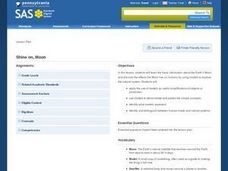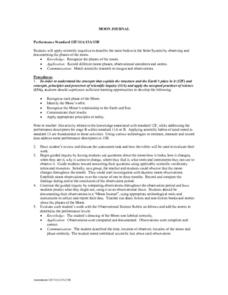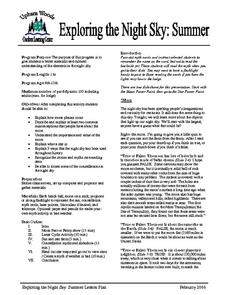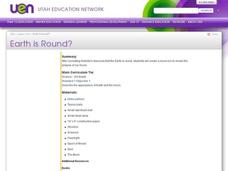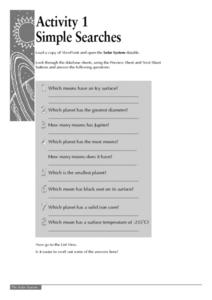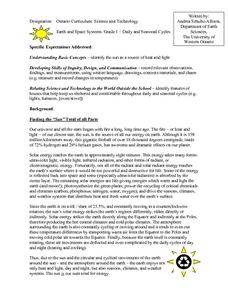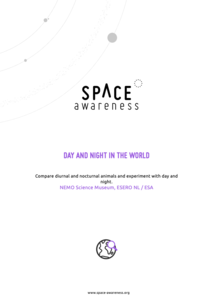Curated OER
Moon Light Through the Month
Students work in small groups to arrange moon phase cards into the correct sequence. The goal is to circle as many consecutive numbers as possible in two minutes.
Curated OER
Planets in our Solar System
A wonderfully designed, and very thorough lesson plan on the planets in our solar system. Designed for third graders, this lesson has learners use technology and multimedia tools to research, explore, and create information about the...
Curated OER
Solar System Hall Model
Not novel, but fun, this lesson gets your space science learners to model the size of the planets and the solar system along your school's hallway. Scaled measurements as well as actual distances are provided for both planet diameters...
Curated OER
Shine On, Moon
Students explore space science by conducting an experiment in class. In this Moon instructional activity, students define a list of space science vocabulary and read the book The Moon. Students utilize shoeboxes and string to conduct a...
Curated OER
Moon Journal
Fourth graders observe Moon and its features, and record results both in written form and in a drawing on the given template.
Curated OER
Moon Observations
Third graders create a model of the moon and use a flashlight to illustrate the various stages of the moon.
Curated OER
Distance in Space
Sixth graders explore space science by measuring distances between planets. In this solar system lesson, 6th graders view a Bill Nye video and discover the conversion between the metric system and imperial measuring systems. Students...
Curated OER
Exploring the Night Sky: Summer
Learners explain how moon phases occur. They describe and explain at least two common misconceptions that people have about the moon. Students explain what a star is. They explain 3 ways that the night sky has been used throughout history.
Curated OER
Voyage: A Journey through our Solar System
Students build the Voyage scale model of the Solar System on a playground and "travel" to each planet. They recognize that the Sun and planets are tiny worlds in a vast space, giving them a new perspective on the Solar System, and...
Curated OER
Earth is Round?
Third graders discuss how Aristotle concluded that the Earth was round. As a class, they review theories about the Earth's shape and describe how life on Earth would be different if it were flat. Individually, they make a moon book in...
Curated OER
The Reasons for the Season
Students explain the reason for the changes in season. In this lesson examining the relationship between the Earth and the Sun, students use an applet to discover how the alignment of the Earth and the Sun cause the change in seasons.
Curated OER
Our Solar System
In this solar system worksheet, students complete a database comparing the 9 different planets' mass, surface temperature, rotation period, orbital period, moons, and distinguishing features. This worksheet is a graphic organizer.
Curated OER
Simple Searches
In this space worksheet, students load a copy of ViewPoint and open the Solar System datafile. There they look through database sheets, using the Preview Sheet and Next Sheet buttons and respond to 8 questions. Then students do some...
Alabama Learning Exchange
The Solar System
Learners explore the Solar System. In this cross-curriculum space instructional activity, students identify the planets, name them in order according to distance from the sun, and describe major characteristics of each planet. Learners...
Curated OER
Daily and Seasonal Cycles
First graders identify the sun as a source of heat and light. They identify features of houses that help keep use sheltered and comfortable throughout daily and seasonal cycles. Students are told that summer is the best season to...
Curated OER
Using a Sundial
Students examine the use of a sundial to tell apparent time. In this sundial lesson plan, students watch a teacher demonstration using a flashlight to create shadows. They discuss what happens to shadows of different objects as the...
Curated OER
Space Facts
Students read space facts and click on the links to research more about space objects. In this space lesson plan, students read about comets, planets, the moon, and more.
Curated OER
The Phases of the Moon
Students view an applet to study the phases of the Moon in relation to the orientation of the sun, moon, and Earth.
Curated OER
Does the Distance Between the Earth and Sun Cause the seasons?
Students reflect upon the concepts of seasons. The concepts are taught using a variety of different teaching approaches. A activities lead to a reflection that will help students to make a cognitive transfer of information form...
Curated OER
The Earth, Sun Mood and Stars Unit (Planets too!)
Fifth graders prepare five activities to do then show their energy saving skills. In this investigative lesson plan students create five projects then participate in an energy saving demonstration.
University of Colorado
The Jovian System: A Scale Model
Jupiter has 67 moons! As the seventh in a series of 22, the exercise shows learners the size and scale of Jupiter and its Galilean moons through a model. They then arrange the model to show how probes orbited and gathered data.
Space Awareness
Day and Night in the World
How do different parts of the world experience day and night? Introduce scholars to the concept of global citizenship while teaching about animal behavior with discussion of nocturnal and diurnal animals. Then, learners complete...
Curated OER
Day and Night
Expand your third graders' universe with a science activity about Earth's rotation. They read a short explanation about the direction of sunlight, then draw an arrow to indicate which way the sun is pointed at an illustration of the...
Star Date
Solar System Scale Model Demonstration
Explore outer space and decorate your classroom with an astronomy project. Learners create a visual model with the creation of a scaled solar system using different sized balls.



